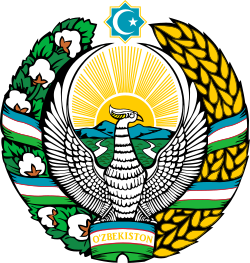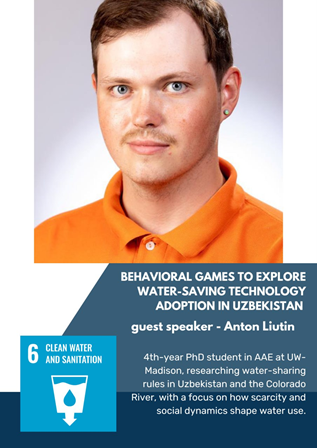PUBLIC-TALK #53 SDG 6: BEHAVIORAL GAMES TO EXPLORE WATER-SAVING TECHNOLOGY ADOPTION IN UZBEKISTAN – PUBLIC TALK BY ANTON LIUTIN, 13 DECEMBER 2024
|
|
Area: Education, Communication, water-saving technologies, irrigation, sustainable water use in agricultural communities. Speaker: Anton Liutin Location: TSUULL International Office, Youtube\Zoom Language: English Organizer: TSUULL International Office Audience: Free and Open to the Public Source: Release and Post Release Overview: On December 13, 2024, the Tashkent State University of Uzbek Language and Literature (TSUULL) will host an insightful public talk as part of its #TSUULLTalks series. The lecture, titled “Behavioral games to explore water-saving technology adoption in Uzbekistan”, will be delivered by Anton Liutin, a researcher specializing in agricultural economics and water resource management. The event will focus on one of the most pressing issues in Uzbekistan’s agricultural sector — the efficient and sustainable use of water resources in the face of increasing scarcity. Through interactive “behavioral games,” participants will gain a deeper understanding of how communities make decisions about adopting water-saving technologies, and how social cooperation, trust, and local rules influence irrigation practices. Speaker: Anton Liutin is a 4th-year PhD student in the Department of Agricultural and Applied Economics (AAE) at the University of Wisconsin–Madison. His research examines water-sharing rules and decision-making patterns in both Uzbekistan and the Colorado River Basin in the United States. With a focus on the interplay between scarcity, infrastructure, and social dynamics, Anton’s work bridges economics, environmental policy, and community engagement. |
Why Attend:
• Explore real-world case studies from Uzbekistan and beyond on water allocation challenges.
• Experience interactive learning through behavioral simulation games that model irrigation decision-making.
• Discuss practical strategies for adopting water-efficient technologies in rural agricultural settings.
• Network with peers and experts in environmental sustainability, water management, and agricultural development.
This session will be of particular interest to students, educators, policymakers, agricultural specialists, and anyone passionate about sustainable resource use. Whether you are studying environmental science, working in rural development, or simply concerned about water scarcity, this talk offers both theoretical insights and hands-on participation.





